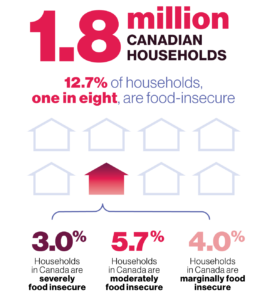March 1, 2022
March is the month that marks the beginning of Spring. As the air begins to lose its chill and early flowers start to bloom, this gives us the opportunity to re-evaluate our wellbeing, end the winter hibernation and look forward to new events and activities.
March is Nutrition Month, an event that is hosted by Dietitians of Canada and features a different theme each year.
This year, the theme for Nutrition Month is about “Ingredients for a Healthier Tomorrow”, where dietitians will explore the actions needed to improve an individual’s health and the health of food systems for today and the future (1). “Food security, food literacy, food sovereignty, sustainable food choices, nutrition care and prevention…these are all ingredients in a sustainable food system in which dietitians across Canada play an active and often leadership role” (1). The connections between food, health and the environment make sustainable food choices important to all Canadians. .
To learn more information on this year’s Nutrition Month, please visit – https://www.unlockfood.ca/en/nutritionmonth
Evaluating an individual’s food security is one of the ingredients for a healthier tomorrow. Food security means that individuals or families have access to sufficient, safe, and nutritious foods that provide dietary adequacy and meet their food preferences to allow for an active and healthy lifestyle (2). “Pre-pandemic, an estimated one in eight Canadians (12.8%) were food insecure” (2). This means that they did not have enough financial means to fight off hunger, follow nutrition recommendations and goals. However, food insecurity may look different in each household. In some households, the concern that food will run out before there is money to buy more, whereas in others, the inability to afford a balanced, nutritious diet or having to skip meals and not eat the entire day because of the concern that money will run out. The COVID-19 pandemic has been hard on everyone and has resulted in increased challenges for those experiencing poverty or food insecurity. It is estimated that with the pandemic it is closer to one in seven Canadians (14%) who struggle with the financial ability to access food (3). “Population groups that are more susceptible to financial constraints and low-income households, including households with lone parents, children, lower levels of education, Indigenous Peoples, and those living in remote regions are more severely affected by food insecurity (2,4).”

Why is Food Security Important to West Toronto Diabetes Education Program (WTDEP)?
Food insecurity can result from multiple factors, but the bottom line is that food insecurity is associated with an increased risk of chronic disease, particularly diabetes (5,6). Those who are food insecure may consume food choices that are inexpensive with less variety in food groups. These food choices are often energy dense, high in sugar content, have saturated and trans fats, which can result in weight gain and poorly controlled diabetes management (6). The diets that are recommended in evidence-based guidelines for diabetes management can pose financial constraints for those who are food insecure and as a result lead to increased risk of diabetes or diabetes related complications.
Food insecurity in those living with diabetes may be experienced differently as they face the challenges of making a choice between buying food over other needs such as, medication and supplies (7). As a result, this impacts their diabetes management, for instance, when there is a delay filling prescriptions, reusing needles, not monitoring blood glucose frequently out of concern of running out of test strips, and making other compromises to their diabetes care (7). Diabetes related complications like hyperglycemia or hypoglycemia can occur when having to face the choice between food and medication, this can lead to higher emotional distress and consequently poor glycemic control (8).
Along with Dietitians, other healthcare professionals such as, Registered Nurses, Social Workers, Peer Workers and Client Advocates can recognize the significant effect that poverty and food insecurity have on health and consider the food security status of their clients when providing advice and support. The diabetes team at WTDEP incorporate food security assessment during individual appointments to identify those living in food insecure households and refer to social assistance and/or food programs. While there are local and national food programs that supply food to individuals that are food insecure, these programs and food banks provide only short-term solutions to address the immediate need for food. The effect of food banks on reducing food insecurity is limited and instead draws away from the underlying systemic causes of food insecurity, such as poverty, housing affordability, geographic location and lack of basic income (9). Nevertheless, these food programs still serve an important purpose and provide temporary relief by increasing access to affordable and nutritious foods to those that are food insecure. Your diabetes team can help refer you to community programming, food programs, food banks and social assistance to help with financial means and food insecurity. Contact your diabetes team or discuss at your next appointment about access to these programs. All things considered, addressing food insecurity will have many positive outcomes including decreased risk of diabetes and diabetes related complications.

As March marks the beginning of change, health care professionals along with YOU can be the advocates to spread awareness about the systemic problems of food insecurity and the reliance of food banks as the sole response. Engage in dialogue, write to the government, post on social media! Every voice, every perspective is important. Participate and be the ingredients for a healthier tomorrow.
To learn more about food insecurity in Canada, please visit –
https://proof.utoronto.ca/food-insecurity/
References
1) Adapted from the Dietitians of Canada’s Nutrition Month materials (2022, Feb 23). Unlock the Potential of Food Ingredients for a Healthier Tomorrow. Dietitians.ca. https://www.dietitians.ca/DietitiansOfCanada/media/Documents/Resources/NM2022-ActivityGuide-EN-FINAL.pdf?ext=.pdf&utm_source=website&utm_medium=banner&utm_campaign=nm_2022
2) Tarasuk V, Mitchell A. Household food insecurity in Canada, 2017-18. Toronto: Research to identify policy options to reduce food insecurity (PROOF); 2020.
3) Statistics Canada. Food insecurity during the COVID-19 pandemic, May 2020. [Internet]. Retrieved Feb 26, 2022. Available from: https://www150.statcan.gc.ca/n1/pub/45-28- 0001/2020001/article/00039-eng.htm
4) Ottawa: Public Health Agency of Canada (2018, May). Key Health Inequalities in Canada: A National Portrait [Internet]. Available from: https://www.canada.ca/en/public-health/services/publications/science-research-data/key-health-inequalities-canada-national-portrait-executive-summary.html
5) Laraia BA, Siega-Riz AM, Gundersen C. (2010, May). Household food insecurity is associated with self-reported pregravid weight status, gestational weight gain, and pregnancy complications. J Am Diet Assoc. 110(5):692–701.
6) Diabetes Canada Clinical Practice Guidelines Expert Committee. (2018). Diabetes Canada 2018 Clinical Practice Guidelines for the Prevention and Management of Diabetes in Canada. Can J Diabetes [Internet]. Available from: http://guidelines.diabetes.ca/docs/CPG-2018-full-EN.pdf
7) Men F, Gundersen C, Urquia ML, Tarasuk V. (2019, July). Prescription medication nonadherence associated with food insecurity: a population-based cross-sectional study. CMAJ Open. 1;7(3):E590–7.
8) López A, Seligman HK. (2012, Feb). Clinical Management of Food-Insecure Individuals with Diabetes. Diabetes Spectr. 1;25(1):14–8.
9) Power E, Dietitians of Canada. (2005) Individual and household food insecurity in Canada: position of Dietitians of Canada. Can J Diet Pract Res Publ Dietit Can Rev Can Prat Rech En Diet Une Publ Diet Can. 66(1):43–6.
